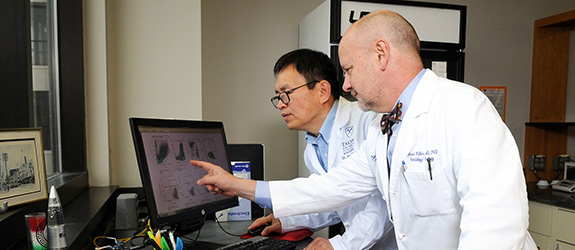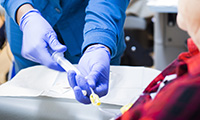Our Research

The main focus of the Waller Lab is on improving the efficacy and outcomes of hematopoietic stem cell transplantation for patients with leukemia and lymphoma. One topic we are investigating is the role of donor immune cells in the graft in regulating immune reconstitution following allogeneic transplantation. We showed that in a mouse model of major histocompatibility complex (MHC) mismatched transplantation, recipients of the CD11b-negative fraction of donor dendritic cells, which was largely composed of donor plasmacytoid dendritic cells (pDC), had improved survival (BBMT 2004). The mechanism for this favorable result was that donor pDC are activated by Interferon gamma to produce indoleamine 2,3-dioxygenase (IDO), which then regulates T-cell immunity in the setting of an MHC mismatched transplant, decreasing death from graft-versus-host disease (GvHD), but maintaining the graft-versus-leukemia (GvL) activity of donor T-cells (Blood 2011). As a planned secondary hypothesis to the BMT CTN 0201 clinical study, we correlated clinical outcomes with content of a variety of immune cell subsets among recipients of both bone marrow and granulocyte- colony stimulating factor (G-CSF) mobilized blood stem cell grafts. Recipients of a bone marrow graft containing more donor pDC and more donor naïve T-cells from an unrelated donor had improved survival with fewer deaths from acute and chronic GvHD (JCO 2014). This novel finding has led to ongoing clinical trials of mobilizing allo-grafts with plerixafor and flt-3 ligand in order to optimize the content of pDC in the graft.
As noted above, a major challenge in allogeneic transplantation is balancing the risks of GvHD and leukemia relapse. Another way we're addressing this challenge is by studying pharmacological modulation of immunity post-transplant. T-cell-directed serotherapy using polyclonal anti-thymocyte globulin (ATG) reduces the risk of GvHD and graft rejection in allo-BMT, but the dose and kinetics of ATG are poorly defined. We found that post- transplant administration of alpha-interferon and granulocyte monocyte-colony stimulating factor (GM-CSF) to patients with acute leukemia that relapsed after allo-BMT could induce the GvL activity of donor T-cells and led to durable remission in some patients (BBMT 2007). To augment the GvL activity of the allograft, we are developing an antagonist of vasoactive intestinal polypeptide (VIP) to augment adaptive immune responses. In our murine model systems, VIP-antagonist-treated allo-transplant recipients are resistant to cytomegalovirus infection with decreased viral loads, increased numbers of antigen-specific T-cells and decreased levels of PD-1 and PD-L1 expression on T-cells and dendritic cells (Blood 2013). We are continuing this very promising line of investigation and have shown that VIP antagonists can also augment the GvL effect of the allograft.
In 2016, we started researching how to improve the expansion of naïve T-cells in patients with diffuse large B-cell lymphoma (DLBCL) in order to allow these patients to have successful chimeric antigen receptor T-cell (CAR-T) therapy. Patients with DLCBL have received extensive treatment which renders their immune cells unable to proliferate. By using drugs like idelalisib and VIP antagonist, we are studying how the morphology of the immune cells can be changed to a more naïve T-cell subset, in-vitro and adoptively transferred to make the patients a viable option for CAR-T therapies.


